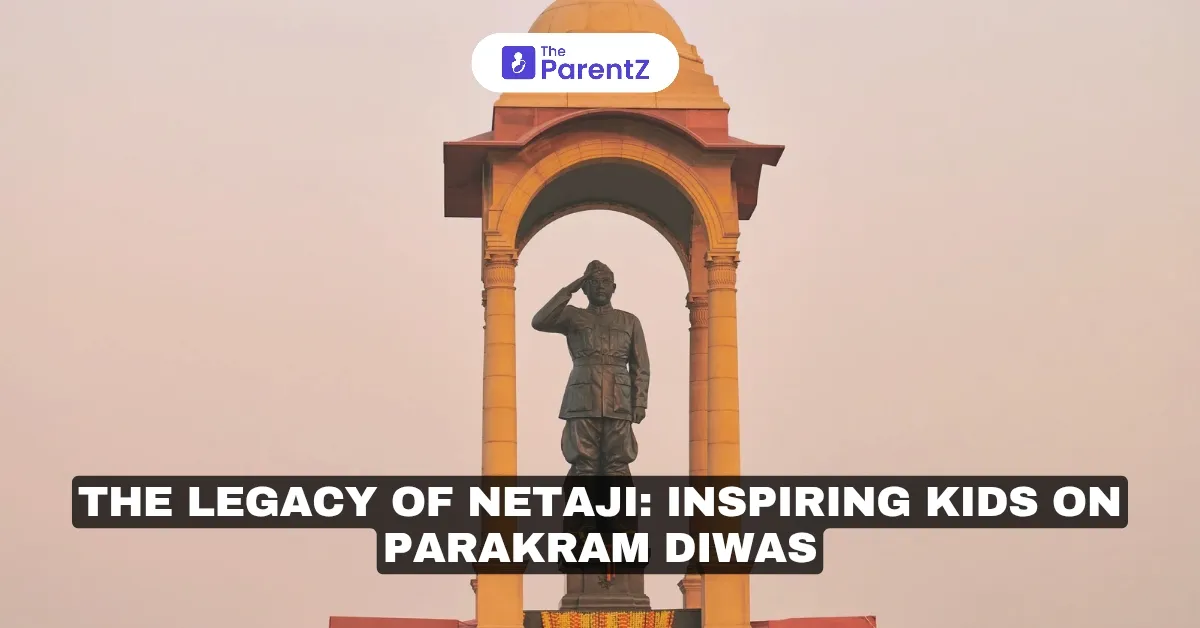In the quiet lanes of Cuttack, Odisha, on a crisp January morning in 1897, a child was born who would become more than just a historical figure - he would become a living legend, a symbol of unyielding courage, and a beacon of hope for millions. Subhas Chandra Bose was not just another son born to Jankidas and Prabhavati Devi; he was a promise of revolution, a whisper of freedom that would soon become a thunderous roar.
As we commemorate Parakram Diwas on January 23, 2025, we honor Netaji Subhas Chandra Bose's remarkable life and struggles. This celebration marks his 128th birth anniversary and serves as a vital opportunity to educate our children about his extraordinary journey and the values he embodied. Young minds need to understand the reality of Netaji's sacrifices and teachings, which can inspire them to embrace courage and leadership in their own lives.
The Crucible of Courage: Early Years and Education
Picture a young Subhas - brilliant, passionate, and restless. Unlike many of his contemporaries who saw education as a path to personal comfort, he saw it as a weapon of transformation. When he ranked fourth in the prestigious Indian Civil Services (ICS) examination in 1920, the world expected him to follow a conventional path. But Subhas was anything but conventional.
In a move that would define his entire life, he resigned from the ICS in April 1921. Why? Because sitting in a colonial administrative system felt like betraying the very soul of his motherland. This was not a moment of rebellion, but a calculated decision of a strategic mind who understood that true change required stepping out of comfortable zones.
Lesson from Netaji's Life: Emotional Intelligence and Self-Awareness
Netaji understood himself deeply. When he realized the Indian Civil Services couldn't fulfill his true calling, he didn't hesitate to resign. This wasn't impulsiveness but profound self-awareness.
Modern Application for Kids:
- Practice honest self-reflection
- Understand your strengths and limitations
- Don't be afraid to change paths if they don't align with your core values
- Learn to listen to your inner voice
The Architectural Years: Building a Revolutionary Framework
A Mentor's Influence: Deshbandhu Chittaranjan Das
Every great journey has a guiding light. For Subhas, it was Deshbandhu Chittaranjan Das - a political guru who saw the fire of nationalism burning in the young Bose. Das was not just a mentor; he was an architect of resistance. He established the National College, and who better to lead it than Subhas? As the college's principal, Subhas was not just teaching; he was nurturing the next generation of freedom fighters.
The Political Battlefield: Arrests, Resistance, and Resilience
Between 1924 and 1940, Subhas ji's life was a series of strategic confrontations with the British colonial system. Each arrest was not a defeat but a strategic move in a larger chess game of freedom:
- October 1924: Arrested for alleged links with revolutionary elements
- January 1930: Imprisoned for leading a procession supporting political prisoners
- 1932: Multiple arrests across different jails, with his health deliberately pushed to the brink
Most would have been broken. Subhas was forged stronger.
Lesson from Netaji's Life: Courage Beyond Physical Bravery
Courage for Netaji wasn't about physical strength but moral conviction. His multiple arrests and strategic escapes demonstrated intellectual and emotional courage.
Modern Application for Kids:
- Stand up for what's right, even when it's difficult
- Speak against bullying
- Have the courage to be kind
- Protect those who cannot protect themselves
The Global Revolutionary: Beyond Conventional Boundaries
The Legendary Escape
At midnight on January 16-17, 1941, Subhas ji orchestrated an escape that would be remembered as a mythical tale. Disguised as a Maulvi, he traveled through Calcutta, Delhi, Peshawar, and Kabul, eventually reaching Germany. This was not just an escape; it was a statement - that no physical boundary could contain his revolutionary spirit.
Azad Hind Fauj: A Dream of United Resistance
In 1943, Subhas did something unprecedented. He established:
- The Azad Hind Government
- The Indian National Army (Azad Hind Fauj)
This was more than a military force. It was a vision of:
- A multi-religious, united resistance
- Breaking colonial psychological barriers
- Proving that freedom knows no linguistic, religious, or regional boundaries
Lesson from Netaji's Life: Strategic Thinking and Problem-Solving
When peaceful resistance didn't yield results, Netaji didn't complain. He strategically formed the Azad Hind Fauj, proving that challenges require creative solutions.
Modern Application for Kids:
- View problems as opportunities
- Break complex challenges into smaller, manageable steps
- Be flexible in your approach
- Learn from failures and adapt quickly
Lesson from Netaji's Life: Inclusive Leadership and Empathy
The Azad Hind Fauj united people across religions, languages, and regions. Netaji proved that true leadership transcends differences.
Modern Application for Kids:
- Respect diversity
- Build teams that celebrate different perspectives
- Practice active listening
- Stand against discrimination in school and social circles
Breaking Every Stereotype
He created:
- The Rani Jhansi Regiment - a women's military force led by Captain Lakshmi Swaminathan
- Regiments named after national heroes: Gandhi, Azad, Nehru
- A fighting force that challenged colonial narratives about Indian capability
Lesson from Netaji's Life: Continuous Learning and Adaptability
Netaji was a perpetual learner. From resigning from the ICS to creating a revolutionary army, he continuously evolved his strategies.
Modern Application for Kids:
- Embrace lifelong learning
- Be curious and ask questions
- Don't fear making mistakes
- See every experience as a learning opportunity
Philosophical Foundations: More Than Just a Freedom Fighter
Strategic Intellect
Subhas was a revolutionary strategist. When peaceful resistance seemed ineffective, he explored military strategies. When one approach failed, he adapted. His mind was a constant battlefield of ideas, always strategizing, always planning.
Global Diplomatic Maneuvers
Incredibly, he:
- Sought support from Germany and Japan during World War II
- Established the 'Independent India Center'
- Broadcast in seven languages to spread the message of independence
- Created the 'Indian Legion' of four thousand soldiers in Berlin
Lesson from Netaji's Life: Balancing Passion with Discipline
His passion for freedom was always balanced with strategic thinking. He didn't just dream; he planned and executed.
Modern Application for Kids:
- Set clear goals
- Create actionable plans
- Practice time management
- Balance passion with consistent effort
Lesson from Netaji's Life: Global Thinking and Cultural Understanding
Netaji's diplomatic efforts with Germany and Japan showed his ability to think beyond immediate boundaries.
Modern Application for Kids:
- Learn about different cultures
- Practice empathy towards global perspectives
- Develop language skills
- Understand the interconnectedness of the world
Teachings for Generations: Beyond Personal Glory
1. Courage is a Choice, Not a Coincidence
Netaji demonstrated that courage is not about being fearless, but about acting despite fear. Every arrest, every strategic move was a conscious choice of principle over personal comfort.
2. Unity Transcends Differences
The Azad Hind Fauj was a living example that people can unite beyond:
- Religious identities
- Linguistic barriers
- Regional differences
3. Adaptability is Strength
His life taught that rigidity leads to failure. True leadership means:
- Continuous learning
- Adapting strategies
- Being flexible in approach
4. Sacrifice is the Truest Form of Love
His legendary quote, "You give me blood, I will give you freedom," was not rhetoric. It was a life philosophy of placing collective good above individual comfort.
A Legacy Eternal
Even his mysterious death on August 18, 1945, could not diminish his impact. Multiple government investigations, global recognitions, and continued reverence prove how deeply he touched India's collective consciousness.
Mahatma Gandhi called him a "compelling personality" and a "patriot of patriots." Sarojini Naidu referred to him as "the flaming sword of Indian patriotism."
Conclusion
Subhas Chandra Bose was more than a freedom fighter. He was a philosophy, a movement, and a dream of what India could become. His life teaches us that one passionate individual can indeed rewrite history.
As we honor him on Parakram Diwas, let us commit ourselves to teaching our children about his struggles, sacrifices, and teachings.
Jai Hind!








Be the first one to comment on this story.